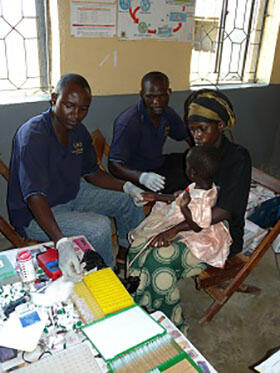
The burden of malaria in sub-Saharan Africa can be high and poses a significant threat to health of young children. During a 3-year longitudinal study investigating the dynamics of malaria and schistosomaisis in mothers and young children living in Ugandan lakeshore communities, researchers from LSTM found a consistently high prevalence of malaria despite regular treatment.
To document the short-term performance of the artemisinin combination therapy of artemether-lumefantrine (AL), a pilot investigation into parasite carriage was conducted in Bukoba village shortly after AL treatment(s). This involved examining a total of 163 children positive for infection, aged between two and seven years old, in closer detail with available state-of-the-art diagnostics.
Children’s blood was tested on day 0 (day of treatment) day 7 and day 17. Those that were still positive on day 7 were retreated with AL and those that were positive on day 17 were (re)treated with oral quinine sulphate and retested on day 24. Of 28 children who tested positive on day 7, 11 also tested positive at day 17. The different species of Plasmodium were recorded throughout, with chronic multi-species malaria infections persisting in some cases after both ACT treatments.
The results are published in the journal Parasitology and outlines the original study which saw on site-treatment decisions being based on rapid diagnostic test (RDT) results, the vast majority of RDT-positives were subsequently shown to be parasitaemic by microscopy and by qPCR. In addition, researchers observed a substantial number of cases of multi species Plasmodium infection, which in many cases persisted in children after several treatments.
Principal author, Professor Russ Stothard, said: “Whilst the performance of AL remains highly effective in treatment of acute cases of malaria, our results suggest that here in Uganda chronic cases of falciparum and non-falciparum infections are much more resilient to AL. Clearly, better point-of-care diagnostics for non-falciparum infections are very much needed together with increased community- based surveillance to verify the full extent and significance of these chronic infections. The poor performance of AL in this setting is of real concern, and it should be further monitored to safeguard this frontline treatment.”
Martha Betson, José C. Sousa-Figueiredo, Aaron Atuhaire, Moses Arinaitwe, Moses Adriko, Gerald Mwesigwa, Juma Nabonge, Narcis B. Kabatereine, Colin J. Sutherland & J. Russell Stothard.
Detection of persistent Plasmodium spp. infections in Ugandan children after artemether-lumefantrine treatment . Parasitology, available on CJO2014. doi:10.1017/S003118201400033X.